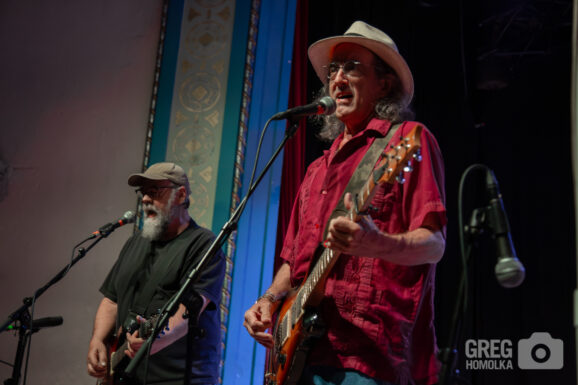[rating=9.00]
 Live at Lafayette’s Music Room is the latest in a recent string of Big Star-related releases dating back to the 2016 release of the Complete Third box set. The current campaign also includes archiving projects in the form of Chris Bell’s I Am the Cosmos, Alex Chilton’s A Man Called Destruction, The Best Of Big Star on Stax and the live tribute recording Thank You Friends.
Live at Lafayette’s Music Room is the latest in a recent string of Big Star-related releases dating back to the 2016 release of the Complete Third box set. The current campaign also includes archiving projects in the form of Chris Bell’s I Am the Cosmos, Alex Chilton’s A Man Called Destruction, The Best Of Big Star on Stax and the live tribute recording Thank You Friends.
But this twenty-track composite of three hometown Memphis performances in January 1973 is not by any means the result of scraping the bottom of the vault. Rather, it is the rescue of a genuine rarity: first released as the fourth CD of the comprehensive Big Star box set on Rhino, Keep Your Eye On The Sky, (now fetching a high price as an out-of-print domestic item), this concert title is a composite of three shows, now available as a stand-alone (on CD, LP and digital formats) through the auspices of Omnivore Recordings.
As recounted by esteemed music journalist Bud Scoppa in his factually scrupulous and empathetic liner notes, the Big Star quartet that recorded #1 Record had already splintered with the ignominious departure of guitarist/vocalist/songwriter Chris Bell (who died tragically shortly thereafter). As a result, remaining members Alex Chilton, Andy Hummel and Jody Stephens rehearsed and played as a trio, demonstrating admirable forethought on a number of fronts, not the least of which is a setlist juxtaposing the similarly-themed “Baby Strange” and Todd Rundgren’s “Slut).
The daring four-song acoustic set in the middle of this sixty-minutes-plus, particularly an exquisite rendition of “The India Song, ” is further proof of Chilton, Hummel and Stephens’ bond, a commitment that transcends the pragmatic aspect of honoring a prior agreement with the venue. Yet that sublime interlude is hardly the only stellar interval in this offering of originals and covers (from such disparate sources T. Rex, the Kinks and the Flying Burrito Brothers). In fact, while the trio format was not in any way intended to offset the (group’s self-admitted) near-interminable overdubbing for the aforementioned first album, the gritty, stripped-down sound here on “When My Baby’s Beside Me,” like the hard rock component of “She’s A Mover,” proffers distinctive elements of the band’s music not always readily discernible in their studio work.
The more prevalent roots of Big Star, extending to the Beatles and the Byrds, remain on display in cuts such as “My Life Is Right,” most conspicuously in the vocal harmonies that waft over the muscular musicianship. Meantime, the riffing in which the threesome engage during the closing “O My Soul,” exhibits the earnest effort guitarist/vocalist Chilton, bassist/vocalist Hummel and percussionist/vocalist Stephens were exerting, a sensation rendered noticeable in the realism of sound on this release as remastered by Michael Graves
Redistributing instrumental and vocal chores to account for their missing comrade makes for some shaky moments here, the most egregious of which is the balladry of Bell’s “There Is A Light.” Yet, on the whole, Live at Lafayette’s Music Room represents a courageous leap of faith by this threesome and, more importantly, may very well constitute that entry in Big Star’s discography that ultimately proves convincing to those who remaining confounded and/or undecided about the validity of the ill-fated band’s legacy.
Various traumas, self-inflicted and otherwise, pepper the history of this group and Scoppa rightly alludes to those in his essay. But the combination of spontaneous imagination and inspired professionalism contained on Live At Lafayette’s Music Room represents the true heritage of Big Star.







